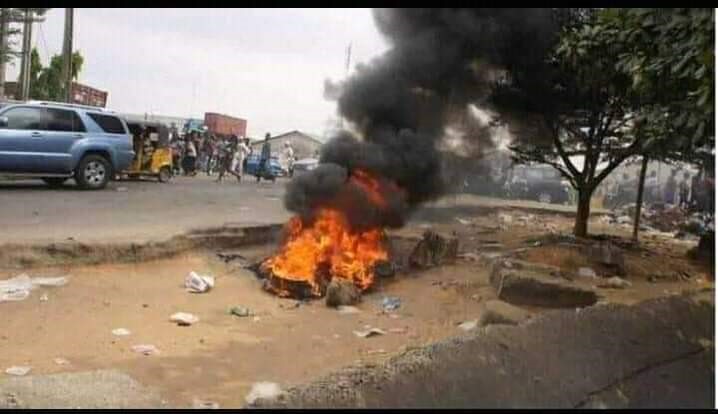Fact check: Misleading Photos Used To Justify Blasphemy Laws

A Nigerian Twitter user, My Deen My Swag, has shared some misleading pictures to defend the death penalty for blasphemy in some states in Northern Nigeria where Sharia (Islamic canonical law) applies.
“Whether they steal food or phone, they don’t deserve to be burnt to dead. They burn people even for stealing N50 to dead [sic], but drag Islam & Kano Sharia Court sentencing an Artist to dead [sic] penalty for blasphemy. We don’t play with Prophet Muhammad. RT let them see their hypocrisy” he tweeted via his handle @AM_Saleeem on Tuesday.
My Deen My Swag’s tweet, which was shared over a thousand times, was a reaction to the decision of an Upper Sharia Court in Kano which, on Monday, sentenced Yahaya Sharif-Aminu, a musician, to death for circulating a song, deemed blasphemous to Prophet Mohammed, on WhatsApp.
The sentencing triggered an outcry on social media, with many condemning the capital punishment. On the other hand, some backers of the Sharia law justified the decision of the court.
Whether they steal food or phone, they don’t deserve to be burnt to dead.
They burn people even for stealing N50 to dead, but drag Islam & Kano Sharia Court sentencing an Artist to dead penalty for blasphemy. We don’t play with Prophet Muhammad.
RT let them see their hypocrisy. pic.twitter.com/8pZiRbu38d
— My Deen My Swag 💫 (@AM_Saleeem) August 11, 2020
One of those in support of the judgement is Saleeem who attached two pictures to his tweet: one showing two young boys who had been stripped naked, tied, and placed in a big truck tire, and the second showing an object burning beside a tarred road. He seemed to suggest that they show lynching incidents that occurred in non-sharia states in Nigeria because the victims stole some money.
Checks show, however, that while the pictures are genuine, the contexts were misplaced. While the first incident took place in Kenya, the second was not retribution for “stealing N50”.
Checking the first picture
Our searches revealed that in one of the earliest postings of the picture of the boys, Yetunde Morenikeji Ajani Raji, on August 8, shared it on Facebook.
Raji, in her caption, copied word-for-word a report from Nairobi News published earlier on July 5. Nairobi News reported that the boys were “burnt alive in Komarock Estate after they were caught stealing mobile phones from a member of the public”.
“They removed part of the motorcycle, bought petrol and used it to end the lives of the two young boys,” one witness had narrated to the news website.
Copying directly from Raji, Femi Fani-Kayode, a Nigerian politician, shared the pictures on his verified Facebook page, where it was then picked up by the Linda Ikeji Blog as well as other local websites.
Our check shows that the first picture, depicting an entirely different incident, was taken in Kenya and not any part of Nigeria.
No link to sharia
Through a reverse search on Yandex, HumAngle traced the second image in Saleeem’s tweet to a news report published on December 18, 2018, by Wuzup Nigeria, which contains other pictures from a lynching incident. Wuzup Nigeria referenced the Nation Newspaper as source.
In the report as captured by The Nation, “a commercial bus driver was lynched to death by a mob for allegedly stabbing a passenger to death over N50 disagreement on Tuesday.”
The incident, it added, took place at Five Star bus stop, along Oshodi-Apapa Expressway in Lagos.
“Another account indicated that the driver had boarded the passengers from Ikotun en-route Oshodi but refused to proceed when he got to Aswani,” the report said.
“He was said to have told the passengers he could not continue the journey and offered to refund N50 from the amount collected so that the passengers can continue their journey. But some of the passengers allegedly refused the condition and insisted that the bus must carry them to Oshodi which led to a scuffle.”
Although taken in Nigeria, the second picture had nothing to do with theft as insinuated by the Twitter user.
Conclusion
The claim implied in the tweet is misleading as the two pictures do not show incidents of lynching that took place in Nigeria following allegations of petty theft. While evidence indicates that the first one occurred in Nairobi, Kenya, the second took place during an alleged fight and stabbing.
The researcher produced this fact-check per the Dubawa 2020 Fellowship partnership with HumAngle to facilitate the ethos of “truth” in journalism and enhance media literacy in the country.
Support Our Journalism
There are millions of ordinary people affected by conflict in Africa whose stories are missing in the mainstream media. HumAngle is determined to tell those challenging and under-reported stories, hoping that the people impacted by these conflicts will find the safety and security they deserve.
To ensure that we continue to provide public service coverage, we have a small favour to ask you. We want you to be part of our journalistic endeavour by contributing a token to us.
Your donation will further promote a robust, free, and independent media.
Donate HereStay Closer To The Stories That Matter





Even if we assumed that the false claims of those justifying lynching was true, their argument still remains irrational and illegal, and hence unacceptable, because:
Two wrongs do not make a right
When those who lay claim to piety start to “help” their God by taking the laws into their hands, they negate the very essence of their believe in an omnipotent higher being, who should be able to fight his own cause, without any help from lesser mortals
Sharia criminal law in Nigeria is unconstitutional and hence illegal. Thus, those justifying illegal sentences passed under such laws are rationalising murder and it is so unfortunate that the chief guarantor of the Nigerian Constitution (the Federal Government) has so far refused to call these criminals to order.